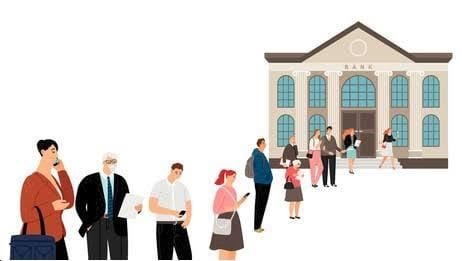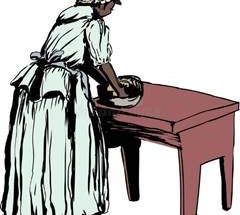By: Ibukunoluwa Keyamo
“Nigeria is a country that has been torn between its desire for democracy and its love for tradition-“
“Well, we are an African country. We can’t just abandon our tradition!”
“Nobody is saying we should. But for this country to progress, tradition can not be in any way involved in our democratic processes!”
“Gentlemen, gentlemen. I’m afraid that’s all the time we have. We’ll be taking calls from our listeners now and-“
“Omoooo,” Bode says from beside me for the tenth time, interrupting the radio panelist session I’m listening to.
He never follows it up with anything. He doesn’t need to; that simple word already conveys so much.
We are outside Gtbank, where we have been since 6 am, with at least 300 other people.
I know the number of people is up to 300 because despite having arrived so early, I am number 206.
“Good afternoon. You’re on ‘Nigeria and its choices’; this is Bisi. What’s your name, and where are you calling from?”
The line crackles, and I scrunch up my face in irritation. Shouldn’t our broadcasting technology be past all this by now?
“My name is Mrs. Bolaji. I’m calling from Iyaganku. I want to say there is no need to fight over this thing-“
I quickly decide Mrs. Bolaji doesn’t have anything important to say and tune her out.
The sun is stinging my scalp, and I deeply regret having decided to go bald. It was Solape o.
“See how big and bushy your beard is. It’s just the half plot of hair on your head that is messing you up,” she had giggled, reaching up to tug on my hair, “Just shave your head and see how girls will be chasing you.”
I roll my eyes now, remembering that conversation. I’d gone to my barber’s shop first thing the next morning and cut all my hair off. That was a week ago. I was yet to play police and thief with any girl.
“Open the gate, nau!!” A man yells angrily in Yoruba at the bank security guard.
The “security guard” is sprawled lazily on a bench, using his uniform cap as a makeshift fan. He doesn’t even glance the man’s way.
Right, why is a small village gathered outside the bank so early in the day?
“How can our currency be scarce in our own country?” Mr. Ayinde from Mokola shouts in my ear.
Ordinarily, the shout would irk me. It’s never that deep. But Mr. Ayinde’s question is valid, and I understand his frustration as it’s the exact same question I have been asking.
Why, in my country, I have to wake up and battle the early morning harmattan cold just to get some cash. Why, if I don’t do that, the alternative would be to spend the holidays in school as there would be no way to pay my transport fare home.
The bank doors open, and a man walks out. Everybody starts pressing forward, even though there’s nowhere to go. The security guard leaps up and comes to the gate. Even I take my AirPods out of my ear.
“180!” The man who just came out shouts.
“Me!!” A woman shoves me to the side as she rushes forward. She shows her paper with her number to the guard, and he opens the gate, a tiny crack for her to squeeze through.
“181! 182! 183! 184! 185! 186! 187! 188! 189!”
The 10 people called Squeeze inside. It’ll be my turn soon. I put my AirPods back in my ear.
“…to buy fuel, you queue. To collect money, you queue. In an election year o! I bought a litre of fuel for four hundred naira today. Four hundred! What’s even more hilarious is that we are still having a hard time making a choice. We’re debating and wondering who to vote for“
The line goes dead, and I hiss.
“Hello? Are you still there? Seems like we’ve lost him.”
“He was right, though. This is an election year. In other countries, politicians take it as their last chance to impress the electorate. For years, this country has been struggling to find a stable government that can offer its citizens a fair chance at prosperity and stability because half the time, the government doesn’t give a shit about the citizens!”
“Erm. Language, sir.”
“Guyyyy,” Bode says, “Do you know how long we’ve been here for?”
I check my watch. It’s 3:30.
“What other choice do we have?”
“They say the maximum withdrawal is 10k sef.“
My heart sinks a little. Ten thousand won’t get me home. It’s better than nothing, though.
“We people of Nigeria have known hope and despair in equal measure. We’ve seen governments come and go, but nothing has truly improved for us. Our poverty remains unchanged, our health system is unreliable, and corruption is rampant. We get a chance, every four years, to do something about it. The chance is here once again.”
The man comes put of the bank again and I pay attention.
“190! 191! 192! 193! 194! 195! 196! 197! 198! 199! 200!”
I wait with bated breath as the people squeeze in. I’m just 6 numbers away now.
“That’s all for today. We are closed.”
The crowd around me erupts into chaos as I stand there, dazed. Since 6am.
Bode curses beside me, “These people have to be joking.”
“So, what you’re saying sir, is that the people of Nigeria have many choices to make: they can choose to remain fixed in their ways or they can pursue change.”
I rip the pod out of my ear. Plus Bisi, plus Mr. Ayinde, plus the politicians, plus Gtbank, be like say everybody dey craze.



